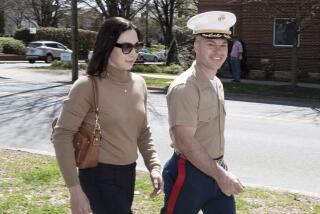Army staff sergeant says she betrayed country in $1-million scam
ELIZABETH CITY, N.C. — In Afghanistan, Tonya Long, a 13-year Army veteran, approved military cash payments to Afghan drivers of “jingle trucks,” the colorful transport trucks that carry supplies to U.S. bases.
Last week, Staff Sgt. Long stood in the dock in a federal courtroom here and read aloud from a statement she had written on notebook paper:
“I cannot express how sorry I am … I chose to betray my country and my family.” She did not ask for mercy, she told a judge, “because I don’t deserve it.”
Long, 30, had pleaded guilty to stealing at least $1 million and shipping the cash in hundred-dollar bills to the U.S. in the guts of hollowed-out VCR players.
Long’s scam is part of a pattern of fraud and theft among U.S. soldiers responsible for paying Afghans who support U.S. forces. Last year, 18 U.S. soldiers were charged with such thefts, according to the Special Inspector General for Afghan Reconstruction. Nine U.S. contractors also were charged.
The inspection agency is now investigating 80 bribery and corruption cases, “and the Tonya Long case is a prime example,” said Special Inspector General John F. Sopko.
Recent prosecutions have described U.S. soldiers creating elaborate schemes to pocket piles of cash, often with the complicity of corrupt Afghans.
Last June, investigators seized $23,000 sewn inside a teddy bear at a base in Afghanistan. The sergeant who had tried to mail the bear to the U.S. told them he was returning cash sent to him to buy carpets, but couldn’t explain why he sewed it inside the bear. The case is under investigation.
In September, a disbursing agent at Bagram Airfield, Sgt. Nancy Nicole Smith, pleaded guilty to forging documents and stealing $100,000 intended for U.S. military operations. Smith stuffed the money in a backpack before her flight to the U.S. at the end of her tour.
In October, Sgt. Christopher Weaver pleaded guilty to his part in a scheme to steal more than $1 million in fuel intended for U.S. forces and sell it to an Afghan. Weaver was paid $5,000 for every 5,000-gallon truck he allowed to illegally leave a U.S. base near Jalalabad.
In December, Staff Sgt. Philip Stephen Wooten, a paying agent, pleaded guilty to stealing about $225,000 by falsifying receipts for money intended for reconstruction efforts. Sgt. 1st Class Mauricio Espinoza, who contracted with Afghan vendors, was charged in the same case.
At least two other U.S. Army officers are under investigation in Long’s scam, and federal prosecutors say more indictments are likely. As part of a plea deal, Long agreed to testify against others allegedly involved.
At Long’s hearing March 4, U.S. District Judge Terrence Boyle called the case “a critically symbolic prosecution,” and speculated that Long and her suspected allies might have actually stolen $10 million or more. The judge suggested that such thefts have been going on since the U.S. mission in Afghanistan began more than a decade ago.
“I can’t disagree with that,” said FBI Special Agent Timothy G. Gannon, who investigated Long.
Long, also known as Tonya Long Keebaugh, was caught after a tipster alerted investigators that the U.S. was paying Afghan trucking companies for phantom deliveries from Kandahar Airfield. The companies gave cash kickbacks to Long and other soldiers, prosecutors said.
In court, prosecutors described how Long loaded the VCRs stuffed with cash into footlockers and cleared them for shipment to the U.S., affixing a seal to the cargo container.
The seal meant the container would not be inspected by customs officers upon entering the U.S. The items were claimed at Pope Field, N.C., by a captain working with Long, according to prosecutors. He locked the money in safes inside his apartment near Ft. Bragg, the prosecution said.
A married mother of three, Long admitted to having sexual relations with the captain and with a second captain, later promoted to major, who was also accused in the scam.
After the first captain gave Long “a large amount of money,” the two ended their affair, Long’s lawyer, Edwin C. Walker, told the judge. But Long continued to receive cash because the captain “wanted to keep her quiet,” Walker said.
Long spent more than $500,000 on a car, an 18-wheel tractor-trailer, vacations and cosmetic surgeries, prosecutors said.
Confronted by investigators, Long cooperated with the FBI. She recorded phone calls with the captain and wore a recording device at face-to-face meetings with him, her lawyer said.
“Those meetings were dangerous,” Walker told the judge. “She took a great risk.”
The judge said Long cooperated only because she had been caught. She faced no danger by wearing a wire, Boyle said.
“She’s stealing from the government and complaining that her confederate put her at risk? How ridiculous is that?” Boyle said.
Long’s theft undermined America’s mission in a country where the Afghan government is routinely accused of rampant corruption and bribery, he said.
“There were tens of thousands of other soldiers … under 24-hour-a-day threat of death,” the judge told Long. “Where is your sympathy for them while you were stealing? What a betrayal!”
Under Long’s plea agreement, Boyle could not sentence her to more than five years in prison. He told her he was imposing the full five years, plus three years of supervised release — and ordered restitution of $1 million.
Long turned to her lawyer, tears streaming down her cheeks. “I’m gonna die, Mr. Walker.... I can’t go to prison.”
The judge brought his gavel down, ending the hearing.
The defendant wailed. She reached down, pulled off her pumps, and bolted from the courtroom, her cries echoing through the courthouse hallways.
More to Read
Sign up for Essential California
The most important California stories and recommendations in your inbox every morning.
You may occasionally receive promotional content from the Los Angeles Times.











